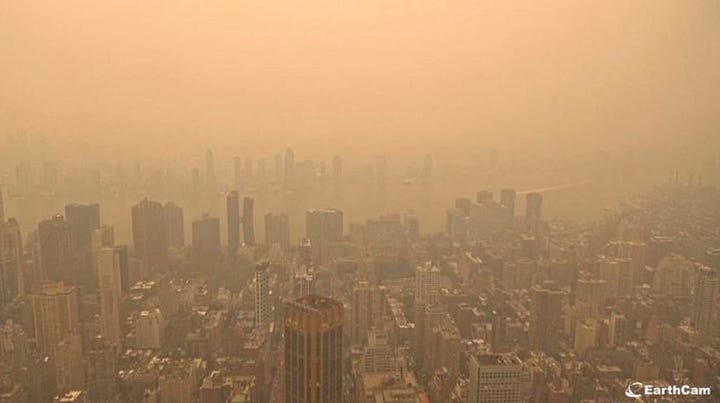Zeus: How climate change will roll through capital markets - an early guide
Insurance rates, municipal bonds, national debt, commodities all will reflect coming disorder.
This column is for Callaway Climate Insights subscribers only, but it’s OK to share once in a while. Was it shared with you? Please subscribe.


New York City (above right), as of Wednesday morning, had the worst air quality out of any major city on Earth due to wildfire smoke from hundreds of uncontrolled fires burning across Canada. Photo: EarthCam via Mike Hudema/Twitter. Compare this with a photo of San Francisco (above left), on Sept. 9, 2020, when smoke from wildfires in Northern California turned the sky over the Bay Area orange and nighttime dark. Photo: Christopher Michel/Wikimedia.
(David Callaway is founder and Editor-in-Chief of Callaway Climate Insights. He is the former president of the World Editors Forum, Editor-in-Chief of USA Today and MarketWatch, and CEO of TheStreet Inc. His climate columns have appeared in USA Today, The Independent, and New Thinking magazine).
SAN FRANCISCO (Callaway Climate Insights) — Jeff Gitterman calls it The Great Repricing.
That’s the shift in capital markets as the cost of global warming begins to mount in specific regions, such as the Canadian wildfires, Arizona water shortages, European heatwaves, or wildfire smoke over New York City or San Francisco. Gitterman, founder of Gitterman Asset Management in New Jersey, has long been a proponent of the idea that climate change will cause a dramatic shift in markets and how investors seek opportunity and hedge risk.
To date, a lot of the focus has been on opportunity. Electric vehicle makers. Battery storage startups. Surging solar and wind power. Carbon capture and removal. But lately, we’ve started to see the flip side. The decision by two of the nation’s largest insurers, State Farm and Allstate, to stop taking new homeowner business in California because of wildfire threats was a dramatic wake-up call last week that the cost of climate change will be shared by many, including businesses and investors.
“There are three trends converging at once,” Gitterman told me. Adaptation, innovation and regulation, or what he calls AIR. “They will impact wide parts of the capital markets; first being real estate values, second municipal bonds and mortgages, and then ultimately businesses where adaptation is costly or undertaken too slowly to offset risks of extreme heat, droughts and larger storms and flooding.”
David Callaway explains why this column is called Zeus in The coming battle with the climate gods: How mortal innovators and investors will save the planet.
Keep reading with a 7-day free trial
Subscribe to Callaway Climate Insights to keep reading this post and get 7 days of free access to the full post archives.

